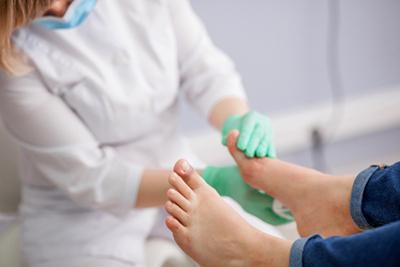
Caring for your feet as a diabetic is critically important because high blood sugar increases a diabetic’s likelihood of developing complications, which can cause serious health issues. If you are diabetic, live or work in Howell Township and Brick, NJ, contact Dr. Keith Rosenthal or a member of our The Foot and Ankle Center’s staff to assist in managing your regular foot checkups and help address any foot complication that may arise from diabetes.
When To See a Podiatrist: Regular Checkups for Diabetic Feet
Diabetic individuals should be proactive in caring for their feet, which should include routine communication and checkups with their healthcare team. In addition, it is recommended that diabetics –
- Manage their blood glucose levels to minimize potential damage.
- Have annual comprehensive diabetic foot care exams to detect issues early.
- Practice proper diabetic foot care at home, which includes –
- Gentle washing
- Moisturizing
- Careful toenail trimming, etc.
- Choosing appropriate footwear can help prevent calluses, pressure, blisters, etc.
- Quit Smoking.
- Engage in regular activity.
When To See a Podiatrist: Warning Signs for Diabetic Feet
In being proactive, diabetic individuals should seek prompt medical care for any concerning symptoms/signs, which include -
Pain/Discomfort
Persistent pain, which may be characterized by tingling, burning, or numbness in your feet, can be indicative of neuropathy – a common nerve damage condition found in those who have diabetes.
Skin Color/Temperature Changes
If you notice changes to the skin color, temperature, or texture of your feet, it may be indicative of a circulation issue.
Swelling
Unexplained ankle/foot swelling can also signal a host of issues, including poor circulation.
Cuts/Sores/Wounds
Slow-healing cuts, wounds, or sores – or those that show signs of an infection, must be treated medically as soon as possible.
Ingrown Toenails/Fungal Infections
Ingrown toenails or fungal infections, which may develop from poor foot hygiene, should be treated promptly to prevent further complications.
Joint Pain/Stiffness
Joint pain or stiffness in the feet could be a sign of arthritis or other conditions that may require intervention.
Corns/Calluses
Excessive corns/calluses can cause ulcers or even infections, so they should be treated medically.
Hammertoes/Bunions
Changes in the shape of the feet may require professional diabetic foot care to prevent further complications and significant damage.
Contact a Leading Howell Township and Brick, NJ Podiatrist Today
For individuals with diabetes, regular diabetic foot care and professional monitoring are crucial to prevent and detect potential complications. For more information, contact Dr. Rosenthal or a staff member at The Foot and Ankle Center at (732) 833-2800 (Howell Township), 732-477-0441 (Brick), or online.